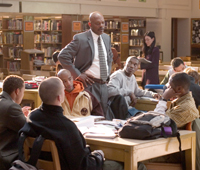Films in the “inspirational sports movie” genre have more clichés and formulas than most other genres in Hollywood. There is always the underdog story, the personal crises, the breakdowns and the redemption. Few films escape most of these clichés and for good reason, since these characteristics are part of the appeal of the genre.
Given this fact, “Coach Carter” sticks to many of the dimensions of the genre with earnest zeal. Based on a true story, Samuel L. Jackson plays Ken Carter, a successful businessman who returns to his alma mater in order to coach the awful and unruly boys’ basketball team. His purpose is to make the athletes not only winners but also students, as each player must sign a contract to maintain a decent GPA. As he whips the players into shape with a drill instructor’s attitude, the team improves and maintains a winning streak. Along the way, players must deal with gangs, drugs, egos and fatherhood.
At the peak of the season, Carter locks up the gym and the team forfeits a couple of games because of the players’ poor academics. The community revolts because they want good ball players regardless of academics. Carter and the team are thrust into the national spotlight. Naturally, the boys recover their grades, attend classes regularly and are ready for the big game at the end of the movie.
While much of this plot is similar to the awful “Sunset Park,” the most redeeming factor for the film is Jackson. In a very subdued and graceful performance, Jackson ditches his typical badass attitude for a stern, intense, yet caring and open personality. His character has a lot to overcome, and Jackson portrays these challenges with the patience and composure of a martyr, preaching a message almost anathema in today’s society.
That message is what makes the film truly noteworthy. It may seem saccharine or melodramatic, but it is certainly a bold statement. These players are not just athletes, but students, and it is through their academics that Carter is attempting to show them the light. Society may love athletes, but school is more important.
The film sticks to this message without wavering. Just when it seems that the film is losing focus, chains go on the gym doors, and both the characters and the audience are supposed to cope with seeing the protagonists struggle to learn. This is the crux and the climax of the movie’s message; it creates the most intriguing drama in the sports genre in a long time.
But there are a number of clichés that are never overcome. Singer Ashanti makes her debut as the pregnant girlfriend of the team captain. She is a horrible actress, and her character is morally dumbfounding.
There are also numerous montages that are hastily used. The basketball games themselves are clumsy, as there are odd moments of slow motion mixed with some choppy editing. But these are only minor faults that never take away from the core message.
Some might say it’s hokey, but the film sticks to its guns and offers good reasons for placing education above athletics.
Jason Bolte can be reached at jmbolte@loyno.edu.

Based on a true story, ´Carter´ follows the story of a coach not afraid to stand up for what´s right. (Paramount)






